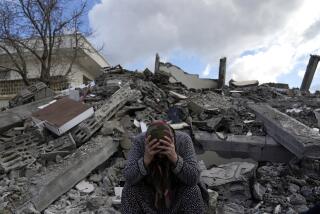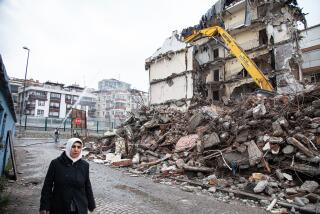The Earthquake’s Silver Lining: Trust
- Share via
Turkey’s political elite would have the world believe that the country’s democracy faces threats from all sides--Kurdish separatists in the east, menacing Greeks to the west, the specter of Islamic fundamentalism lurking everywhere.
What last month’s earthquake exposed, however, was an indifferent political elite that is itself the greatest threat to democratic institutions as well as to the growth of civil society in Turkey. The challenge facing Turkey’s political elite now is to open the political debate to new forces that will demand the honesty and efficiency that the current political class has been unable to deliver.
In the past, the government has creatively--but successfully--portrayed potential challengers as enemies of the state. Kurdish nationalists were ruthlessly repressed, even forbidden to speak their own language. Military leaders often dramatized minor disputes with Greece to distract attention from domestic issues. And Islamist politicians have been sentenced to long prison terms on trumped-up charges for speaking out.
The government’s campaign to discredit or outright eliminate its enemies found widespread support among ordinary Turks, many of whom were looking for scapegoats to blame for the social and economic injustices that pervade Turkish society.
The earthquake, however, changed everything. While the government struggled to cope with the disaster, the state’s traditional enemies came through. For the first time, truly independent forces--the very ones the government accuses of undermining the state--enjoyed public support. Kurdish leader Abdullah Ocalan surprised almost everyone by unilaterally calling for his guerrilla forces to suspend their campaign against the Turkish state.
Greece was among the first of Turkey’s neighbors to offer massive earthquake assistance; Athenian relief workers even pulled several Turks out from under their collapsed homes. Greek leaders then made an extraordinary offer to relinquish Greece’s veto on European Union development and even EU membership for Turkey; one nationalist newspaper was so moved that it plastered “Thank you, friends” in Greek across its front page.
Finally, Islamist groups displayed great courage and superb organizational skills in delivering massive quantities of quake aid well before the government acted. Within hours, relief workers proudly displaying Islamic symbols were operating soup kitchens, providing medical care and handing out tents to earthquake victims. These gestures stood in stark contrast to the government’s anemic relief efforts.
So the public now sees for itself that the emperor wears no clothes and the elites are on the defensive. Nationalist politicians rejected a reasonable-sounding Kurdish offer to give up arms in exchange for a general amnesty. Health Minister Osman Durmus set much of the early tone of the government’s response to the quake by haughtily rejecting Greek blood and Armenian rescue workers, saying Turks did not need help from foreigners.
Most disturbing, military leaders announced a new offensive against Islamist organizations and threatened to curtail interest groups that organized successful quake relief efforts. When an Islamist member of parliament claimed that the earthquake was “Allah’s retribution” against a godless Turkey, the army ordered that the politician be swiftly apprehended. These quixotic efforts have further alienated the public at a time when the government’s approval is at record lows.
But while the government continues to needlessly risk its credibility by defending the indefensible, the earthquake also has provided a unique opportunity to redefine the political landscape of Turkey. The EU is closer than ever to admitting Turkey, the Greeks and Kurds are increasingly willing to settle their long-running scores with Ankara, and the Islamists have won over even many of their detractors by acting with remarkable courage and dedication in the midst of a national tragedy.
Even more surprisingly, the public has tipped its hat toward these long-time foes; Turks are showing the first signs that they are ready to shed the paranoia that has encumbered them for so many years. But it is up to the political elites in Ankara to act on this new spirit of conciliation. If they do, Turkey will have found the silver lining in the earthquake cloud that destroyed so many innocent lives.
More to Read
Sign up for Essential California
The most important California stories and recommendations in your inbox every morning.
You may occasionally receive promotional content from the Los Angeles Times.










